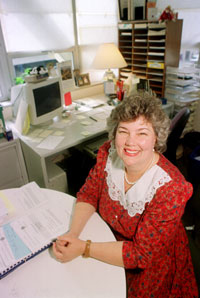|
HOME | SEARCH | ARCHIVE |
|
Benefits manager's personal essay highlights need for reform
| |
|
15 NOVEMBER 00
Few people in the Bay Area have spent time in as many local nursing homes as campus Benefits Manager Mary DeShaw, whose recent article "Nursing Home Odyssey" has attracted attention from throughout the nation and beyond.
DeShaw's intimate acquaintance with nursing home life began in 1996, when her aging mother, Alice Martin, was forced to move from a residential senior citizen housing complex to custodial care in a skilled nursing facility.
That first establishment, in many important ways, was not the "home" DeShaw had hoped to find for her mother. Over the next 21 months, Martin moved to a number of other nursing homes, in search of what she called "just the right place for me."
Along the way, she encountered many small, spirit-killing indignities, as well as many good-hearted employees caught in what DeShaw now calls "a broken system." Alice Martin passed away in Sept. 1998, while living in her seventh nursing home.
As a way of creating good out of adversity, DeShaw recently completed an article that included 10 recommendations for nursing-home reform. She sent it to federal legislators interested in the subject, and to Diane Driver, academic coordinator of campus's Resource Center on Aging, who forwarded it to a listserv.
The response - from nursing home professionals and reformers as well as interested individuals - was overwhelming. DeShaw has received dozens of messages from around the country and some from as far away as the United Kingdom. A National Public Radio producer is interested in including her in a program on nursing home issues.
Berkeleyan writer Cathy Cockrell recently interviewed DeShaw about "Nursing Home Odyssey." Exerpts from that conversation and from DeShaw's essay follow. An unabridged copy of DeShaw's article is available at http://socrates.berkeley.edu:/~aging/ publications.html.
What led up to
moving your mother to a nursing home?
My
mom began needing help to live independently about 10 years prior to going
into the nursing home. During that time, I went out every week with my
daughter to take my mother grocery shopping and to lunch, clean her home,
do all her paperwork and anything else that was needed to keep her going.
The year prior to going into the nursing home, I had to go much more often. When she fell and could no longer walk without assistance, there were no other options for her but to go into a skilled nursing facility. She was acutely aware that she was never going to get back to her home as she knew it.
During that
time you were a principal benefits analyst in campus Human Resources,
and caring, outside of work, for both your mother and a young child. How
were you able to manage it all while holding down your job?
From
a personal standpoint, I am fortunate to have a supportive husband, William,
who handled most of the day-to-day aspects of running our home. Beyond
that, my colleagues at work are the epitomy of the "office family" and
couldn't have been more understanding.
From a professional standpoint, the university's policies on flex time and telecommuting, which the chancellor and my former manager, Yvonne DeVaughn, fully supported, were key to my survival during the "odyssey" years. I am greatly indebted to the chancellor's advisory committee on dependent care for their "Guide to Balancing Work and Family," which contains a clear explanation of alternative work arrangements.
I relied on voice mail and my cell phone extensively, and remember one episode in particular when my mom was in the hospital, and I was able to work for several days by her bedside using one of those eating trays for a desk. Also, the elder care counselor in CARE Services, Norma Grimm, gave me some really good tips and was very helpful during the process.
What made you
decide to write an article about this experience?
When
I was going through this experience, I felt such a sense of helplessness
in terms of trying to negotiate the system. It didn't take long to realize
that people on the inside of these institutions, both residents and staff,
are reluctant to report problems because they're afraid of retribution.
In most of the places, you see the worst and the best of people trying to make a system work that is inherently broken - the way they get reimbursed, the fact that they're making a profit off of the problems of the elderly and infirm. I think the temptation to cut costs is just too much sometimes.
One week before my mom passed away I met Ella Adler, a Holocaust survivor, at a wedding. She asked me "Would you like to hear my story?" So for about an hour, this gentle, petite 76-year old told me the story of her experience in Auschwitz, what happened in the Jewish ghettos in Kracow, and her escape. Before we parted company, she asked, "Do you know why I tell my story? It wasn't the evil people during the Holocaust who were the problem; it was the millions of good people who stood by and said nothing."
Ella's words were in my thoughts so profoundly at the time my mom passed away. I realized that I was an eyewitness to events that needed to be broadcast to the general population. I thought, "who else can be an eyewitness, besides someone who has really been there?"
excerpts from Nursing Home Odyssey, by Mary De Shaw
Home | Search | Archive | About | Contact | More News
Copyright 2000, The Regents of the University of California.
Produced and maintained by the Office of Public Affairs at UC Berkeley.
Comments? E-mail berkeleyan@pa.urel.berkeley.edu.
